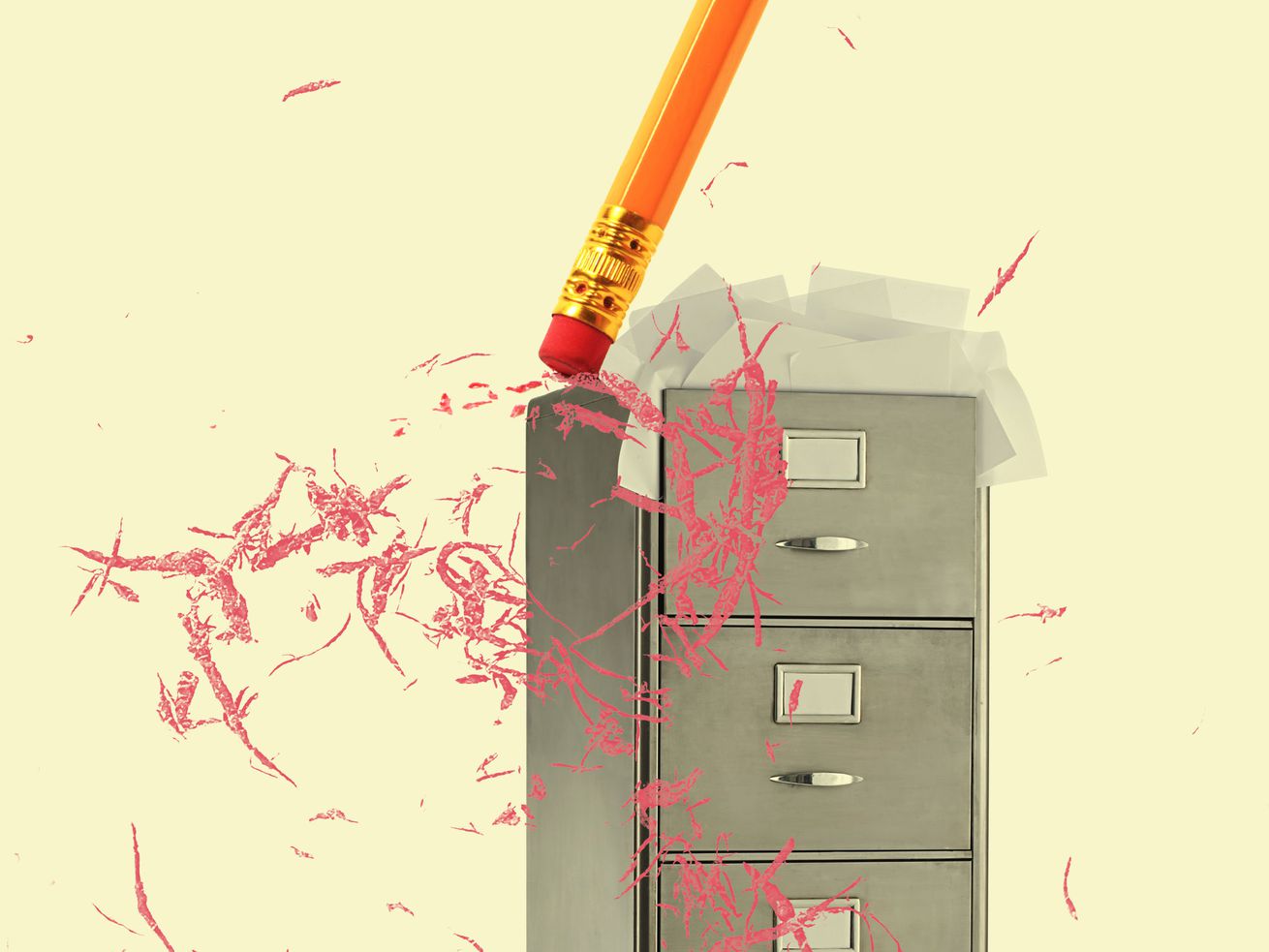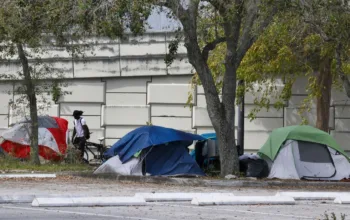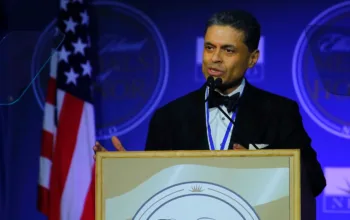Sealing felony records is integral to a bill sitting on Gov. Gavin Newsom’s desk.
Encounters with the criminal justice system, no matter how long ago or for what reason, can ruin a person’s life. California is on the verge of an ambitious attempt to change that.
An estimated 70 million to 100 million Americans have a criminal record, a history with law enforcement that turns up on background checks and sometimes Google searches. Applicants with criminal records can be half as likely as those without them to get a callback or job offer. Nearly 9 in 10 employers use criminal background checks; so do 4 in 5 landlords, and 3 in 5 colleges and universities. These practical realities make it harder to successfully reintegrate into society, in what researchers call “collateral consequences” of mass incarceration.
Most states have laws allowing for some form of criminal record clearing. Eligible individuals — generally those with no convictions, or who were convicted of a low-level offense — are typically required to petition a judge or state agency for clearance. Most don’t, whether because of the cost, complexity, or simply from lack of information. One University of Michigan study published in 2019 found over 90 percent of those eligible didn’t apply.
As a result, the “Clean Slate” movement was born — a recent push by criminal justice reformers to automatically clear, or seal from public view, records for eligible offenses.
Pennsylvania was the first state to enact automatic record clearing in 2018, followed by Utah, California, Michigan, Virginia, Delaware, and Colorado. Michigan’s law — passed in 2020 — was the first state to automatically clear some prior felony offenses.
A new bill, SB 731, recently passed by the California legislature and now sitting on Gov. Gavin Newsom’s desk, would go further.
If signed, SB 731 would significantly expand automatic sealing eligibility for people who served time in prison. And while people with violent, serious felony records would not be offered the automatic “clean slate,” they could, for the first time, petition to have their records sealed. Virtually all ex-offenders, except registered sex offenders, would now be eligible for relief.
“Clean slate automates the current process, but what we said is, the current process sucks,” said Jay Jordan, CEO at Alliance for Safety and Justice, the criminal justice group that has led the charge for SB 731. Jordan said they’ve been focused on making the petition process easier for individuals with records, so that everyone could have their fair day in court.
Two decades ago Jordan was sentenced to prison for a gun robbery charge. “I did eight years in prison and when I got out at 26 and tried to navigate the world, I realized I couldn’t,” he told Vox. He was rejected from various jobs and he and his wife are still facing barriers to adopting a child. “I’ve dedicated my life to trying to change this,” he said. “If I can get free, then everyone else can get free.”
How SB 731 would work
The bill’s author, state Sen. Maria Elena Durazo, wanted to help ex-offenders have an easier time transitioning out of prison. “About 75 percent of formerly incarcerated individuals are still unemployed after a year of their release,” Durazo told the Los Angeles Times. “So something’s wrong there. We expect them to get back on their feet, but we’re not allowing them the resources to get jobs and [have] careers.”
Under SB 731, while landlords and most employers would not be able to view expunged records, public and private schools would still be able to review them during job background checks. Law enforcement, courts, and the state justice department would also still have access to the sealed records, and individuals would be required to disclose their criminal history if asked about it when applying to serve in a public office, among other exceptions. And the law would not apply to sex offenders.
“This is not an über-progressive bill,” acknowledged Jordan. “We worked heavily with folks who don’t necessarily share our vision, the licensing agencies, the DOJ, it went through the rings of fire. But because of that, we’ve got the ‘mod squad’ on board,” he said, referring to the more centrist lawmakers in the state legislature.
If signed into law, record relief would become available for most defendants convicted of a felony on or after January 1, 2005, if they had completed their sentence and any remaining parole and probation, and had not been convicted of a new felony offense for four years. Advocates originally wanted records sealed after two years, but that version failed to clear the state assembly a year ago.
Californians for Safety and Justice estimates at least 250,000 people would be eligible for automatic record sealing under SB 731, and possibly as many as 400,000. Will Matthews, a spokesperson for the group, told Vox they believe at least 1 million more individuals would gain the right to petition courts for record clearance.
What we know — and don’t know — about record clearing’s effects
Criminal justice researchers caution that even if automated record clearing expands to millions more people nationwide, it might not inevitably make it easier for people with criminal records to find jobs or places to live. While some research is in the works, not much is yet known about how these record-clearing policies work in practice.
Beginning in 2004, some criminal justice reformers pushed to pass “ban the box” policies, a bipartisan reform that effectively barred employers from asking about a job applicant’s criminal history until at least after an interview. The majority of states ultimately did it for public-sector employment and at least 12 did so for private employers as well.
But the success came with some unintended consequences. Research published in 2016 found employers were actually more likely to discriminate based on race following the passage of “ban the box” policies, thus increasing racial disparities in job interviews. More recent research suggests the reforms have done little to increase employment for ex-offenders in the private sector.
Last month, three California academics published a new analysis showing that the eligibility criteria for automatic record clearing can also exacerbate racial disparities. California’s record clearing laws — passed in 2016, 2018, 2019, and 2021 — have disproportionately benefited white Californians over Black Californians, the scholars found. “It is easy to see how racial disparities in criminal record relief might emerge, as a range of discretionary decisions by criminal justice actors from the time of arrest through to sentence completion can affect subsequent eligibility,” they wrote.
“Policies don’t start from nowhere,” Amy Lerman, one of the study’s co-authors, told Vox. “We know that Black Americans have historically been much more likely to live in heavily policed neighborhoods, to be stopped and questioned by police, and to be sentenced to prison or jail. That means when you pass a law that limits criminal record clearance to only people who have committed some types of crimes, or who have some types of criminal records, it is going to have a different impact across racial groups.”
SB 731 would be an improvement over the status quo, the California scholars told Vox, but racial disparities would likely persist until offenses classified as serious or violent, such as robbery, are included for automatic eligibility. They pointed to empirical research published in 2009 that found among people arrested at age 18, the risk that they would be arrested again eventually declined to match people of the same age who had not been arrested. It took 7.7 years after a robbery arrest, 3.8 years after a burglary arrest, and 4.3 years after an aggravated assault arrest.
The impact of SB 731 would also likely come down to implementation. New notification systems may be needed so that eligible candidates become aware of their new rights; also needed are clear agency guidelines regarding missing data and timely communication between state agencies and commercial background companies.
Data collection and quality have been an issue for criminal justice reformers in the past, and the challenges are exacerbated by the rise of digitized records online. Every year, digital records of over 10 million arrests, 4.5 million mug shots, and 14.7 million court proceedings are digitally released nationwide. Often, outdated or false paper trails create additional barriers for those looking to seal their records.
Tiffany Lewis, a San Francisco-based consultant who advises tech employees on their job applications, predicted that SB 731 would do little to remove the kind of criminal information an employer routinely finds online. Private companies also aggregate, scrape, and share criminal record data. To prevent this, Sarah Esther Lageson, a professor of criminal justice at Rutgers University-Newark, said states need to issue stronger regulatory standards and limit employer and landlord uses of unregulated background checks.
Lageson told Vox that the best thing states could do is centralize their criminal record disclosure policies. “For instance,” she said, “police departments might disclose pre-conviction mug shots, while courts release a different set of criminal case information online, while the office in charge of releasing rap sheets might only disclose convictions from seven years ago.”
Such disclosure patchworks can cause harm and undermine automatic record-sealing efforts. “States might also consider ending the bulk release of pre-conviction records altogether, reserving the release of some mug shots and arrest or charging information on a case-by-case basis or through more traditional transparency law requests,” she said.
There’s new federal momentum for record relief
While there’s always a risk with criminal justice reform that advocates will pass incremental measures that leave too many behind, early experience with clean slate policies suggest activists are not looking at passing record-clearing legislation as a one-and-done activity.
California is not the only state pushing to expand eligibility from its initial reforms. Following the passage of Pennsylvania’s clean slate bill in 2018, a provision requiring payment of fines and fees for clearance emerged as a major barrier to relief. One analysis found that half of otherwise eligible misdemeanor convictions statewide and 75 percent of otherwise eligible misdemeanor convictions in Philadelphia would be disqualified due to relatively small amounts of outstanding debt. Two years later activists succeeded in removing the fines and fees requirement in Pennsylvania.
On the federal level, two bipartisan bills to aid automatic record clearing have also picked up momentum and are scheduled for their first House Judiciary Committee markups later this month. One bill, the Clean Slate Act, would automatically seal federal arrest records for individuals who weren’t convicted, and records for individuals convicted of low-level, nonviolent drug offenses after successfully completing their sentence.
A second bill, the Fresh Start Act, would create a federal grant program to help states build the infrastructure necessary to implement automatic record clearing. President Joe Biden had floated this latter idea while on the campaign trail in 2020.
“Historic levels of bipartisan momentum have continued to trickle up from the states to Congress,” said Rebecca Vallas, a senior fellow at the Century Foundation who helped develop the clean slate model.
For now, Jordan and other advocates in California remain optimistic that Newsom will sign SB 731 into law, even though the governor vetoed a bill last month to establish new supervised drug-injection sites. With rumors of presidential ambitions, some critics believe Newsom ducked signing the bill out of fear it would be used against him on a national campaign trail. A spokesperson for the governor, Omar Rodriguez, declined to comment on SB 731, but said “the bill will be evaluated on its merits.”
Author: Rachel M. Cohen
Read More



